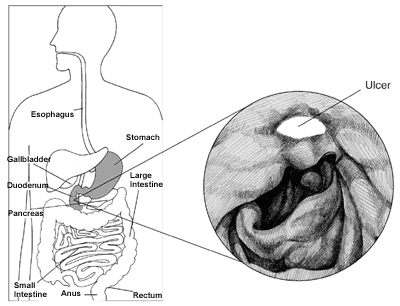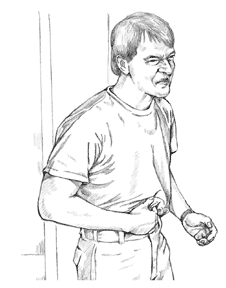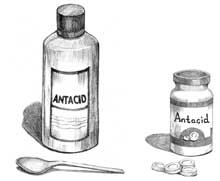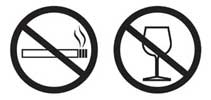What I need to know about Peptic Ulcers
On this page:
What is a peptic ulcer?
A peptic ulcer is a sore in the lining of your stomach or duodenum.* The duodenum is the first part of your small intestine. If peptic ulcers are found in the stomach, they're called gastric ulcers. If they're found in the duodenum, they're called duodenal ulcers. You can have more than one ulcer.
*Linked terms are defined in the glossary.
Many people have peptic ulcers. Peptic ulcers can be treated successfully. Seeing your doctor is the first step.

Peptic ulcers occur in the wall of the stomach and duodenum.
[Top]
What are the symptoms of peptic ulcers?

A burning pain in the gut is the most common symptom. A burning pain in the gut is the most common symptom. The pain
- feels like a dull ache
- comes and goes for a few days or weeks
- starts 2 to 3 hours after a meal
- comes in the middle of the night when your stomach is empty
- usually goes away after you eat
Other symptoms are
- losing weight
- not feeling like eating
- having pain while eating
- feeling sick to your stomach
- vomiting
Some people with peptic ulcers have mild
symptoms. If you have any of these symptoms, you may have a peptic ulcer and should see your doctor.
[Top]
What causes peptic ulcers?
Peptic ulcers are caused by
- bacteria called Helicobacter pylori, or H. pylori for short
- nonsteroidal anti-inflammatory drugs (NSAIDs) such as aspirin and ibuprofen
- other diseases

Nonsteroidal anti-inflammatory drugs can cause peptic ulcers.
Your body makes strong acids that digest food. A lining protects the inside of your stomach and duodenum from these acids. If the lining breaks down, the acids can damage the walls. Both H. pylori and NSAIDs weaken the lining so acid can reach the stomach or duodenal wall.
H. pylori causes almost two-thirds of all ulcers. Many people have H. pylori infections. But not everyone who has an infection will develop a peptic ulcer.
Most other ulcers are caused by NSAIDs. Only rarely do other diseases cause ulcers.
[Top]
Do stress or spicy foods cause peptic ulcers?
No, neither stress nor spicy foods cause ulcers. But they can make ulcers worse. Drinking alcohol or smoking can make ulcers worse, too.
[Top]
What increases my risk of getting peptic ulcers?
You're more likely to develop a peptic ulcer if you
- have an H. pylori infection
- use NSAIDs often
- smoke cigarettes
- drink alcohol
- have relatives who have peptic ulcers
- are 50 years old or older

Having relatives with peptic ulcers puts you at risk of having them too.
[Top]
Can peptic ulcers get worse?
Peptic ulcers will get worse if they aren't treated. Call your doctor right away if you have any of these symptoms:
- sudden sharp pain that doesn't go away
- black or bloody stools
- bloody vomit or vomit that looks like coffee grounds

Call your doctor if the pain gets worse. These could be signs that
- the ulcer has gone through, or perforated, the stomach or duodenal wall
- the ulcer has broken a blood vessel
- the ulcer has stopped food from moving from the stomach into the duodenum
These symptoms must be treated quickly. You may need surgery.
[Top]
How can I find out whether I have peptic ulcers?
If you have symptoms, see your doctor. Your
doctor may

Peptic ulcers can show up on x rays.
- take x rays of your stomach and duodenum, called an upper GI series. You'll drink a liquid called barium to make your stomach and duodenum show up clearly on the x rays.
- use a thin lighted tube with a tiny camera on the end to look at the inside of your stomach and duodenum. This procedure is called an endoscopy. You'll take some medicine to relax you so your doctor can pass the thin tube through your mouth to your stomach and duodenum. Your doctor may also remove a tiny piece of your stomach to view under a microscope. This procedure is called a biopsy.
If you do have a peptic ulcer, your doctor may test your breath, blood, or tissue to see whether bacteria caused the ulcer.
[Top]
How are peptic ulcers treated?
Peptic ulcers can be cured. Medicines for peptic ulcers are
- proton pump inhibitors or histamine receptor blockers to stop your stomach from making acids
- antibiotics to kill the bacteria
Depending on your symptoms, you may take one or more of these medicines for a few weeks. They'll stop the pain and help heal your stomach or duodenum.
Ulcers take time to heal. Take your medicines even if the pain goes away. If these medicines make you feel sick or dizzy, or cause diarrhea or headaches, your doctor can change your medicines.
If NSAIDs caused your peptic ulcer, you'll need to stop taking them. If you smoke, quit. Smoking slows healing of ulcers.
[Top]
Can I use antacids?
Yes. If you have a peptic ulcer, taking antacids will
- stop the acids from working and reduce the pain
- help ulcers heal
You can buy antacids at any grocery store or drugstore. But you must take them several times a day. Also, antacids don't kill the bacteria, so your ulcer could come back even if the pain goes away.

Antacids can reduce pain and help ulcers heal.
[Top]
Can peptic ulcers come back?
Yes. If you stop taking your antibiotic too soon, not all the bacteria will be gone and not all the sores will be healed. If you still smoke or take NSAIDs, your ulcers may come back.
[Top]
What happens if peptic ulcers don't heal? Will I need surgery?
In many cases, medicine heals ulcers. You may need surgery if your ulcers
Surgery can
- remove the ulcers
- reduce the amount of acid your stomach makes
[Top]
What can I do to prevent peptic ulcers?
- Stop using NSAIDs. Talk with your doctor about other pain relievers.

[Top]
What can I do to lower my risk of getting peptic ulcers?
- Don't smoke.
- Don't drink alcohol.

[Top]
Glossary
Barium (BAIR-ee-um): A chalky liquid used to coat the inside of organs so that they will show up on an x ray.
Biopsy (BYE-op-see): Removing a small piece of tissue to view under a microscope.
Duodenum (doo-AW-deh-num): The first part of your small intestine, right after your stomach.
Endoscopy (en-DAH-skoh-pee): A test to look inside the stomach and small intestine. The doctor uses a thin, flexible tube that contains a light and a tiny video camera. This device is called an endoscope.
Helicobacter pylori (HELL-ih-koh-BAK-tur
py-LOH-ree): A bacterium that can damage stomach and duodenal tissue, causing ulcers. It is known as H. pylori for short.
[Top]
For More Information
You can get information about peptic ulcers from the
Centers for Disease Control and Prevention
1600 Clifton Road
Atlanta, GA 30333
Phone: 1–888–MY–ULCER or 404–639–3534
Internet: www.cdc.gov
[Top]
Acknowledgments
The National Digestive Diseases Information Clearinghouse (NDDIC) would like to thank the following individuals for assisting with scientific and editorial review of this publication.
David A. Peura, M.D., University of Virginia
Steven J. Czinn, M.D., Case Western University
Thanks also to Anne Barker, R.N., B.S.N., at the Health Alliance, Columbia, MD, for facilitating field-testing of this publication.
[Top]
National Digestive Diseases Information Clearinghouse
2 Information Way
Bethesda, MD 20892–3570
Phone: 1–800–891–5389
TTY: 1–866–569–1162
Fax: 703–738–4929
Email: nddic@info.niddk.nih.gov
Internet: www.digestive.niddk.nih.gov
The National Digestive Diseases Information Clearinghouse (NDDIC) is a service of the National Institute of Diabetes and Digestive and Kidney Diseases (NIDDK). The NIDDK is part of the National Institutes of Health of the U.S. Department of Health and Human Services. Established in 1980, the Clearinghouse provides information about digestive diseases to people with digestive disorders and to their families, health care professionals, and the public. The NDDIC answers inquiries, develops and distributes publications, and works closely with professional and patient organizations and Government agencies to coordinate resources about digestive diseases.
Publications produced by the Clearinghouse are carefully reviewed by both NIDDK scientists and outside experts.
This publication is not copyrighted. The Clearinghouse encourages users of this publication to duplicate and distribute as many copies as desired.
NIH Publication No. 05–5042
October 2004
[Top]
|




